
Description
Aquaculture, as an industry, is at the forefront of ensuring food security and supporting blue economy growth. The integration of advanced sensor systems in aquaculture has the potential to revolutionize operations, optimize production, and ensure environmental sustainability. However, the effectiveness of these sensor systems is contingent upon the operators’ ability to effectively deploy, maintain, and interpret the data they provide. This initiative focuses on training operators to maximize the benefits of these new tools.
Impact During the Project
Enhancing Operational Efficiency:
Traditional State: Without specialized training, aquaculture operators might rely on traditional, manual methods for monitoring and decision-making which might not be as efficient or accurate.
Advancement: With the knowledge of the new sensor system, operators can harness real-time data for timely decision-making, leading to optimized feeding, better disease management, and efficient resource use.
Reducing Environmental Impact:
Traditional State: Traditional aquaculture methods might inadvertently cause environmental issues, such as nutrient overload or spread of diseases.
Advancement: The new sensor system, when used effectively, can monitor water quality parameters, detect early signs of diseases, and ensure optimal feeding, reducing waste and potential environmental impacts.
Impact Post Project
Sustaining Aquaculture Growth:
Traditional State: As demands on aquaculture increase, without technological interventions, the industry might face challenges in scaling sustainably.
Advancement: Trained operators using advanced sensor systems can ensure that aquaculture operations scale without compromising on quality, environmental standards, or resource efficiency.
Creating a Revenue Stream:
Traditional State: Once a training program concludes, the knowledge dissemination typically ends, unless refresher courses are organized occasionally.
Advancement: By attaching a cost to the legacy training, there’s an opportunity to make the training initiative self-sustaining. This can fund continuous updates to the training material, expand the training’s reach, and ensure that new entrants or operators who wish to upgrade their skills can always access high-quality training.
Advancement over and above State of the Art
The shift from traditional aquaculture practices to a data-driven, sensor-integrated approach marks a significant advancement in the industry. By training aquaculture operators on this new system, the initiative ensures that the industry is equipped to meet future challenges and demands sustainably and efficiently. Moreover, by creating a paid legacy training system, the initiative ensures continuous knowledge dissemination and creates a revenue stream, ensuring that future operators have access to up-to-date training, and the advancements made today continue to benefit the industry for years to come.
Links and References
Link to D3.6 – Sensor implementation on Eulerian Obs: https://eurosea.eu/download/eurosea_d3-6_implementation_of_ph_sensor_on_eulerian_observations_revised_resubmitted/?wpdmdl=5530&refresh=650197c6111d81694603206
